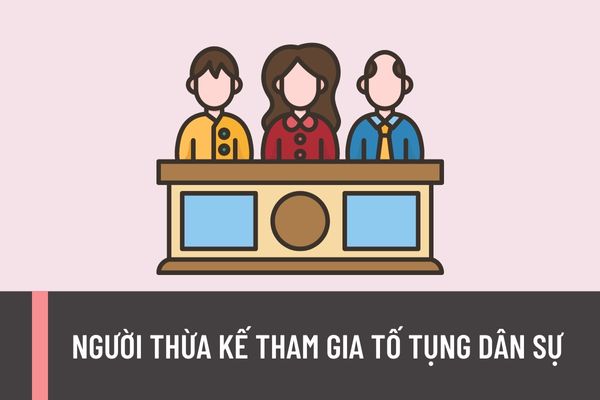Heirs shall represent the deceased in continuing to participate in civil proceedings upon the death of the party, correct?
Will the inheritor represent the litigant to continue participating in the civil litigation case if the litigant dies?
Based on Article 74 of the Civil Procedure Code 2015, the provisions for this case are as follows:
Inheritance of procedural rights and obligations
1. In case the litigant is an individual participating in litigation who dies, and their property-related rights and obligations are inherited, the inheritor shall participate in the litigation.
Thus, according to the above regulations, in the case where the litigant is an individual participating in a civil litigation case and dies, if their property-related rights and obligations are inherited, the inheritor of that person will participate in the litigation.
If the litigant does not leave a will, the determination of the inheritor will be carried out according to Article 651 of the Civil Code 2015 regarding the order of inheritance as follows:
(1) The first order of inheritance includes: spouse, biological parents, adoptive parents, biological children, and adopted children of the deceased;
(2) The second order of inheritance includes: paternal grandparents, maternal grandparents, siblings of the deceased; nieces and nephews of the deceased where the deceased is the paternal/maternal grandparent;
(3) The third order of inheritance includes: great-grandparents, great-grandchildren of the deceased; paternal/maternal uncles, paternal/maternal aunts, and grandchildren where the deceased is the uncle, aunt, or from a generation above.
Note: Those in the later order of inheritance shall only inherit if there is no one in the earlier order of inheritance due to death, ineligibility to inherit, being disqualified from inheritance or declining the inheritance.

Will the inheritor represent the litigant to continue participating in the civil litigation case if the litigant dies?
How does the court resolve the issue of the inheritor to continue the civil case if the inheritor cannot be determined?
According to Clause 1, Section III of Official Dispatch 206/TANDTC-PC of 2022 announcing the online resolution of some difficulties in adjudication work issued by the Supreme People’s Court:
COMMERCIAL BUSINESS
...
"At the same time, the Court guides the plaintiff to have the right to request the Court to announce the search for the person absent from their residence (as per Chapter XXV of the Civil Procedure Code 2015) or request the Court to declare a person missing (as per Chapter XXVI of the Civil Procedure Code 2015) for the inheritor of procedural rights and obligations. After obtaining the results of the search for the person absent from their residence or a decision declaring a person missing for the inheritor of procedural rights and obligations, the Court will continue to resolve the case according to the general procedure."
Thus, in the case where the residence of the inheritor of procedural rights and obligations cannot be determined, the Court will guide the plaintiff to have the right to request the Court to announce the search for the person absent from their residence or request the Court to declare a person missing for the inheritor of procedural rights and obligations.
After obtaining the results of the search for the person absent from their residence or a decision declaring a person missing for the inheritor of procedural rights and obligations, the Court will continue to resolve the case according to the general procedure.
Who are the litigants in a civil case?
Based on Article 68 of the Civil Procedure Code 2015, the provisions are as follows:
Litigants in civil cases
1. Litigants in a civil case are agencies, organizations, individuals including plaintiffs, defendants, and those with related rights and obligations.
Litigants in civil matters are agencies, organizations, individuals including those requesting the resolution of civil matters and those with related rights and obligations.
2. The plaintiff in a civil case is the person who initiates a lawsuit, or another agency, organization, or individual designated by this Code to initiate a lawsuit to request the court to resolve a civil case when he/she believes that his/her legitimate rights and interests have been infringed upon.
Agencies and organizations designated by this Code to initiate civil cases to request the court to protect public interests or state interests in the sectors under their charge are also plaintiffs.
3. The defendant in a civil case is the person against whom the plaintiff initiates a lawsuit, or another agency, organization, or individual designated by this Code to initiate a lawsuit to request the court to resolve a civil case when he/she believes that his/her legitimate rights and interests have been infringed upon.
According to the above provisions, litigants in a civil case are agencies, organizations, individuals including plaintiffs, defendants, and those with related rights and obligations.
LawNet